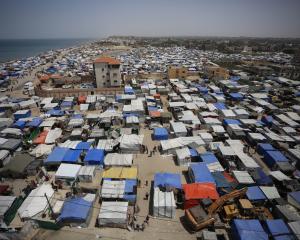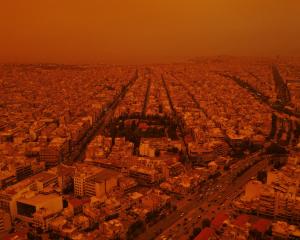An armoured column of Chadian troops, experienced in desert operations, moved north from the Niger capital Niamey on the road to Ouallam, some 100km from the Malian border, where Nigerien troops are already stationed.
France, which launched air strikes in Mali 11 days ago to halt a surprise Islamist offensive toward the capital Bamako, has urged a swift deployment of the planned UN-mandated African force to back up its 2,150 soldiers already there.
The number of French troops could be boosted to more than 3,000 in the coming days and weeks, a source with knowledge of the matter said on Tuesday.
The aim of the intervention is to prevent northern Mali from becoming a launchpad for international attacks by al Qaeda and its local allies in North and West Africa. Fears of this increased sharply after a hostage-taking raid by Islamist militants last week on a gas plant in Algeria.
An entry into Mali from Niger by part of the African force would widen the front of operations against the Islamist alliance in the north that groups al Qaeda's North African wing AQIM and the Malian militant groups Ansar Dine and MUJWA.
On Monday, French and Malian armoured columns moved into the towns of Diabaly and Douentza in central Mali after the rebels who had seized them fled into the bush to avoid air strikes. Diabaly is only 350 km (220 miles) north of Bamako, while Douentza is 800 km away from the riverside capital.
Niger President Mahamadou Issoufou, who visited the troops at Ouallam, condemned the Islamist alliance, and an imam, or Muslim cleric, said prayers for the troops.
"We are going to war. A war imposed on us by traffickers of all kinds, an unjust war, from which the peaceful citizens of northern Mali are suffering terribly," Issoufou told the forces.
"I am confident in your burning desire for victory."
France says its troops will remain in Mali until they have completely dislodged the Islamist fighters from the north and fair elections can be held in its former colony.
In support of France, the United States has started transporting French soldiers and equipment to Mali from the Istres air base in southern France. Washington on Tuesday completed the fifth of an estimated 30 flights in an airlift expected to run for about a week.
A Reuters correspondent in Bamako saw a US military cargo plane land at the international airport and offload about 40 French soldiers, jeeps, and other equipment.
Britain, Belgium, Canada and Denmark were already transporting French materiel to Mali. Benson said the United States was also working with France on intelligence issues, but declined to say if surveillance drones were being used.
"EVERYONE WILL FIGHT"
France has also sent jet fighters and attack helicopters that have blasted rebel bases for more than a week, as it awaits troops from nearby African nations to deploy to the front line.
Some 1,000 African troops from the West African regional bloc ECOWAS and the central African nation of Chad have arrived, and that number is expected to top 5,000 in the coming weeks.
Military experts say the swift and effective deployment of African forces is crucial to sustain the momentum of France's air campaign and prevent Islamists from melting away into the empty desert or the rugged mountains near the Algerian border.
Niger's armed forces, which completed their training a month ago, are expected to advance toward the rebel-held north Malian city of Gao in collaboration with the Chadian troops. It was not clear when exactly they would cross the border.
Gao, the largest city of Mali's north, has been hit by French air strikes in recent days.
Niger has already sent a technical team to Mali, part of a battalion of 544 troops accompanied by French liaison officers.
Nigeria, a big oil producer, also plans to deploy some 1,200 troops in Mali and its president, Goodluck Jonathan, said they would stay there until the crisis was resolved.
Colonel Oumar Kande, ECOWAS military and security adviser in Mali, told Reuters in Bamako the original plan for the U.N.-backed ECOWAS military intervention in the north was being changed to adapt to fast-evolving circumstances.
Instead of the Malian army alone playing the combat role, with ECOWAS supporting, now "everyone will fight", Kande said.
"We need to adjust to the reality on the ground."
Kande said ECOWAS was concerned about its troops having to fight a difficult counter-insurgency war in a northern Mali desert and mountain battleground the size of Texas against Islamist fighters likely to shun a head-on conventional fight.
"Given the force of the reaction from the international community, they (the rebels) are likely to adjust and begin an asymmetrical war, ambushes, strikes by small cells," he said.
"It is possible we will win back Timbuktu, Gao, and Kidal in a month, but it is impossible to say how long the overall war will last."
The rebels have imposed severe sharia (Islamic law) in areas they control, carrying out amputations and at least one fatal stoning, and wrecking ancient shrines sacred to moderate Sufi Muslims.
$450 MLN SOUGHT FOR AFRICAN TROOPS
International donors will be asked to finance training and support for the Malian, ECOWAS and other African troops involved in the deployment of the U.N.-backed African force AFISMA against the Islamist alliance.
Donors are to meet at a conference in the Ethiopian capital Addis Ababa on Jan. 29 and France said they would be asked to provide about 340 million euros ($452 million).
"We estimate that the Malian forces needs will be around 120 million euros and about 220 million euros for AFISMA for a full year," French Foreign Ministry spokesman Philippe Lalliot said.
Since the French started their operations earlier in January to block the jihadist thrust out of northern Mali, several thousand civilians have fled the recent fighting to neighbouring states, the U.N. refugee agency UNHCR said. In Mauritania, 4,208 Malian refugees have arrived since January 11, it said.
Niger had seen 1,300 new refugees, mainly from Menaka and Anderamboukane, while during the same period, Burkina Faso had received 1,829 new refugees, mainly Tuaregs and Songhai from the regions of Gossi, Timbuktu, Gao and Bambara Maoude.
This was on top of almost 400,000 Malians displaced since April, when an offensive by Tuareg rebels allied with Islamist fighters seized Mali's largely desolate north following a military coup in Bamako in March.












